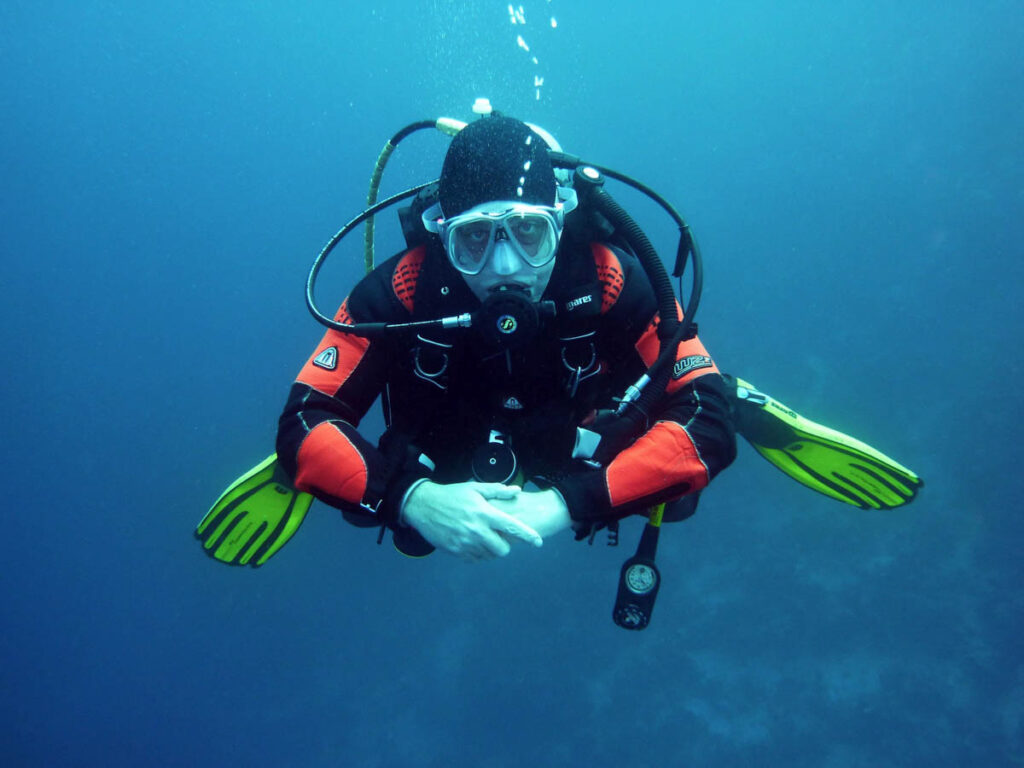When people think of scuba instructors, they often picture someone tanned, laid-back, and living in paradise. And yes, sometimes that is true. But that is only the surface view. What most people miss is that becoming and working as a scuba instructor is not just a job or a lifestyle — it is one of the most intense, hands-on leadership and life training programs anyone can go through.
If you are thinking about becoming a scuba instructor, understand this: you are not just learning how to teach people to dive. You are building a foundation for life — one that can launch you into any number of successful careers down the line.
No lecture hall, no online course, no business school teaches what a scuba instructor learns through experience. And any instructor leaving the industry does themselves a disservice if they list their past as nothing more than “Scuba Instructor – 2016 to 2025” on a CV. That entry should shout: Leader. Communicator. Problem-solver. Risk manager. Resilient operator. Globally aware professional.
Because that is what the role truly is — and here is why.
1. Unmatched Leadership in Real Time
A scuba instructor is responsible for lives every single day. Not metaphorically — literally. One wrong decision can have grave consequences. Teaching someone to breathe underwater requires calm, confident leadership, fast decision-making, and a sharp awareness of group dynamics.
This is not textbook leadership. It is earned leadership — the kind forged when a nervous student loses control at 18 meters and looks to you for safety and calm. Businesses dream of hiring people who can lead like that under pressure.
2. Split-Roll Management: Teamwork Above, Sole Responsibility Below
One of the most unique aspects of scuba instruction is the dual nature of the role. On the surface, instructors work closely with other staff — planning logistics, coordinating boat crews, managing student progress. It is a team environment.
But underwater, it is different. The instructor is on their own. Once submerged, they carry full responsibility for the safety, performance, and decision-making of the dive. There is no one to defer to — they are the leader.
This kind of split-roll adaptability is rare. It teaches instructors to collaborate effectively, but also to function independently when it counts. That balance is a huge asset in management, field operations, emergency response, and any high-accountability profession.
3. Communication That Cuts Through Anything
Imagine having to explain life-saving skills to someone who does not speak your language, is terrified, and is doing it all for the first time. Now imagine doing that clearly, calmly, and with a smile.
Scuba instructors become expert communicators. They learn how to simplify the complex, adjust their style for different people, read body language, and build trust fast. These are the exact skills great trainers, salespeople, customer service professionals, and team leaders need — and few ever develop them to this level.
4. Problem Solving and Risk Management Built on Reality
Dive instructors become masters of managing risk. Equipment fails. Weather shifts. Medical issues arise. And through it all, the instructor must make the right call — quickly, calmly, and with safety in mind.
That kind of judgment is forged in the field, not in a seminar. It is the kind of practical intelligence that employers prize — especially in operations, logistics, hospitality, and team management.
5. Resilience in the Face of Challenge
Let us be blunt: scuba instructors do not make a lot of money. Most live on tight budgets in expensive locations. There is often no pension plans, no career ladder, no HR department. And yet they find a way to make it work — teaching with passion, solving problems on the fly, and delivering a high-quality experience.
That builds a level of grit and adaptability that is rare. It is also something employers cannot teach — but absolutely want in their teams.
6. Emotional Intelligence and People Skills
Scuba instructors work with people from all walks of life — from anxious beginners to confident adventurers. They deal with excitement, fear, frustration, joy, and everything in between. They coach, calm, motivate, and guide.
Over time, they develop deep emotional intelligence and people skills that are incredibly valuable in roles that require empathy, leadership, or public interaction — such as HR, sales, education, and healthcare.
7. Global Awareness and Cultural Fluency
Many instructors work across countries and cultures. They have learned to function in unfamiliar legal systems, adapt to different customs, and collaborate with international teams. They understand nuance, cultural sensitivity, and how to be effective anywhere in the world.
In a globalized workplace, which is a major asset — particularly for international business, NGOs, travel, and customer-facing roles.
8. Resourcefulness from Doing More With Less
Instructors often work with limited equipment, tight schedules, and unpredictable conditions. They do not always have the latest tech or ideal setups — but they still deliver remarkable results. They have learned to be resourceful, frugal, and efficient — a mindset that startups and growing businesses, especially love.
More Than Just a Job Title
If you are a scuba instructor moving into another industry, do not undersell yourself. Your role was never about diving. You were managing safety, performance, logistics, emotions, learning, and risk — every single day.
The scuba instructor path may not leave you financially rich — but it will leave you skilled, resilient, and equipped for anything the world can throw at you.







